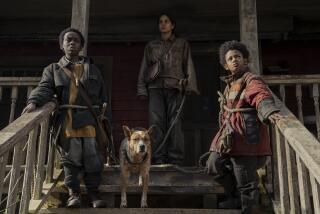‘Brooklyn,’ ‘Connecticut’ in Holiday Spirit; ‘Amazing Grace and Chuck’ Pitches for Peace
If you’re into holiday movies, you’ve probably rented all the good ones. How many times can you see “Miracle on 34th Street,” “White Christmas” and “Holiday Inn”? For variety, you might try two that recently debuted on home video:
“A Tree Grows in Brooklyn” (1945, Playhouse, $59.98). In the middle of this movie is a stark, warm-hearted sequence showing what it’s like to celebrate Christmas in poverty. Directed by Elia Kazan, this is a drama about dreams vs. reality in a tenement in turn-of-the-century Brooklyn. The film focuses on a poor Irish family headed by a strong, practical mother (Dorothy McGuire) and a father (James Dunn) who’s a drunken dreamer. When they clash, their young daughter (Peggy Ann Garner), who tends to be a dreamer, is caught in the middle. Dunn won an Oscar but McGuire’s performance is the heart of this movie.
“Christmas in Connecticut” (MGM/UA, 1945, $24.95). There’s lots of Christmas cheer in this tangled tale of a magazine columnist (Barbara Stanwyck) who writes about food, farm life and marriage, though ignorant of all three. To salvage her job she has to orchestrate a homey Christmas weekend in Connecticut for her boss and for a war veteran (Dennis Morgan). Of course, she falls for the veteran. Though she made her reputation in dramas, Stanwyck, with that tough, terse manner, was great in romantic comedies like this. If you’re unfamiliar with the work of rugged Morgan, one of the forgotten leading men of the ‘40s, this is a good introduction.
Here are two others, long available on home video and often overlooked, that are suitable for the season:
MCA’s “Christmas in July” (1940) is about a clerk (Dick Powell)--the unwitting victim of a joke--who goes on a summertime spending spree thinking he’s won a small fortune in a contest. Of course, it all turns out happily. Written and directed by Preston Sturges, this romantic comedy is often--and unfairly--neglected when his best movies are listed.
They don’t come any merrier than Disney’s “Pollyana” (1960), about a radiant, optimistic orphan (Hayley Mills) who cheers up the sourpusses in a small New England town. Long but thoroughly heart-warming.
NEW RELEASES: In HBO’s far-fetched, overly sentimental “Amazing Grace and Chuck,” director Mike Newell seems to be making his version of one of those Depression-era fairy tales for which director Frank Capra is famous. It’s about a small-town Little League star named Chuck (Joshua Zuehlke) who vows never to pitch again until the world is free of nuclear weapons.
This inspires pro basketball star Amazing Grace Smith (capably played by the Denver Nuggets’ Alex English) to join the anti-nuke battle, touching off an international protest that ultimately involves the President (Gregory Peck). Its point--that the average man can be a powerful political force--is hammered home. But even if you agree with its anti-nuke message, you may find that its preachy, solemn tone puts you off.
Watching New World’s “Beyond Therapy,” you’re likely to wonder what are all these talented people--Jeff Goldblum, Glenda Jackson, Tom Conti, Julie Hagerty--doing in this strained, unfunny farce. Another talented person--director and co-writer Robert Altman--is principally to blame. What’s supposed to be a savage spoof about therapists is just a chaotic collision of characters. Goldblum and Hagerty play wacky patients in a budding relationship, with Jackson and Conti portraying their therapists. The joke--that the therapists are loonier than the patients--is beaten into the ground.
In Vestron’s “The Gate” two youngsters unwittingly provide a gateway for demons to enter our world through a hole in a backyard. Though it starts slowly, there are some scary moments in the second half, with the demons terrorizing the kids (their parents are away for the weekend). You’ve seen all this before--in “Poltergeist” and “Ghostbusters,” but with more interesting characters and more skilled direction. Heavy-metal music takes a beating in this one. A sinister metal album, which yields a message when played backwards, turns out to be the key to the mystery of the demons. No, the movie wasn’t partially financed by the Parents Music Resource Center.
Vestron’s “One Woman or Two,” directed by Daniel Vigne, is a brash, hearty French farce that showcases Sigourney Weaver’s comic touch. She plays an opportunistic advertising agent who schemes to use an archeological discovery--the bones of a 2-million-year-old French woman--in an ad campaign. In the process, she falls for the klutzy scientist (Gerard Depardieu) who discovered the skull. For a while the very tall ad agent impersonates a tiny American philanthropist, played with surprising effectiveness by Dr. Ruth Westheimer. Warning: The movie’s relentlessly anti-Americanism may rankle some fans. In French with subtitles.
OLD MOVIES: “The Harvey Girls” (MGM/UA, $29.95, 1946 ), about waitresses invading the Wild West, isn’t one of Judy Garland’s best musicals, but it’s still entertaining. It’s swept along by an infectious, giddy charm that makes its faults--such as an infantile script--seem minimal. The rousing “Atchison, Topeka and the Sante Fe”--near the beginning--is one of the best production numbers in movie musicals.
“The Enforcer” (1951, $29.95, Republic), starring Humphrey Bogart, is one of those gritty urban crime dramas photographed in stark black and white, teeming with those eerie, tension-enhancing shadows. Bogart plays a district attorney tracking a mob of hit men. It focuses more on the mobsters than the D.A., whose character is rather sketchy. Though it’s an absorbing movie, Bogart fans aren’t too crazy about it because their hero doesn’t have a dominant role.
Though “Dead End” (Nelson Entertainment, 1937) is remembered as a Bogart movie, he plays just a supporting role--as a notorious killer. Still, it’s the most vivid acting in this grim, gripping urban drama which is a series of interwoven vignettes about a New York slum bordering a ritzy area. Joel McCrea plays an idealistic scholar who’s romancing a poor girl (Sylvia Sydney) and a rich girl (Wendy Barrie). There’s some stirring, Depression-era social commentary in the script by Lillian Hellman, which was based on Sidney Kingsley’s play. This is probably most famous as the film that launched the Dead End Kids--which include Leo Gorcey and Huntz Hall--who wound up starring in a long-running movie series.
More to Read
Only good movies
Get the Indie Focus newsletter, Mark Olsen's weekly guide to the world of cinema.
You may occasionally receive promotional content from the Los Angeles Times.










